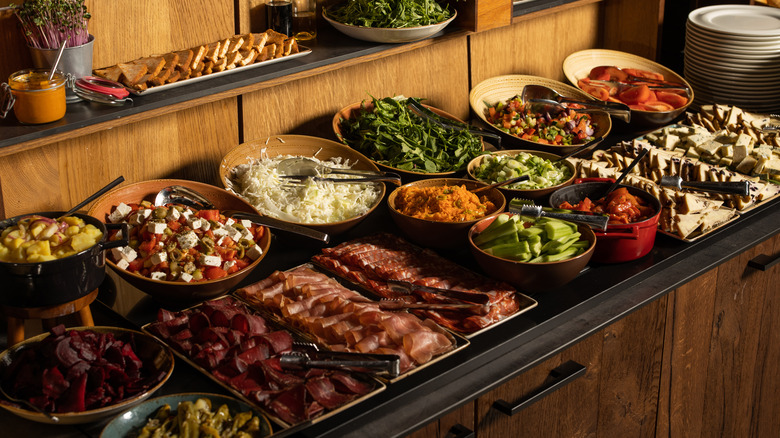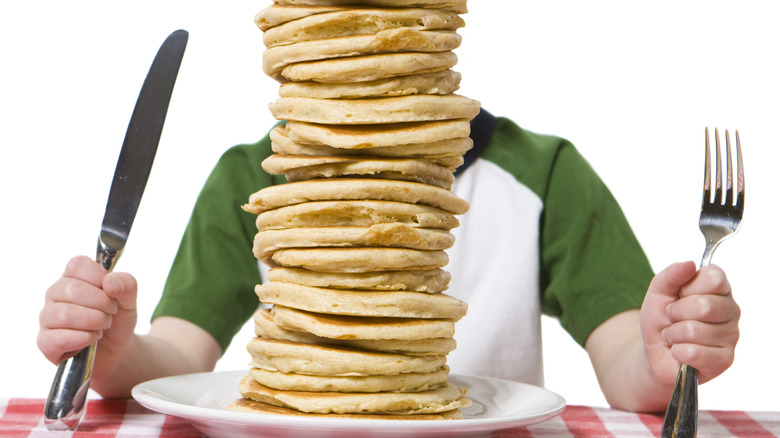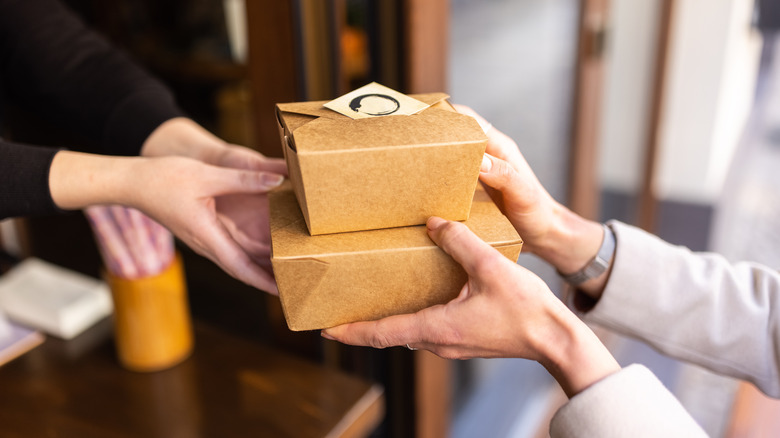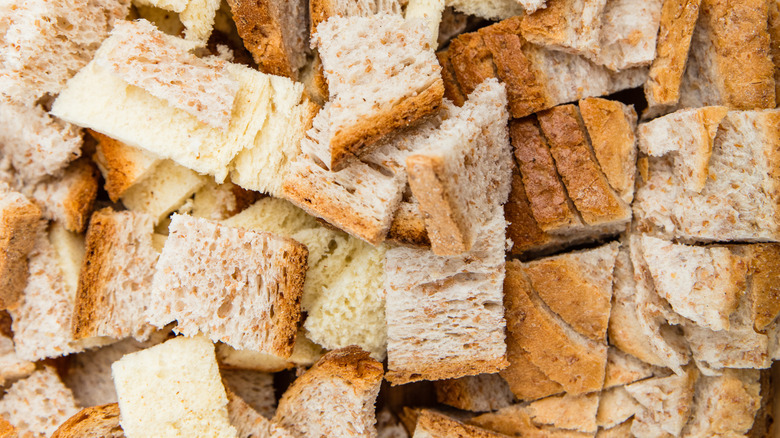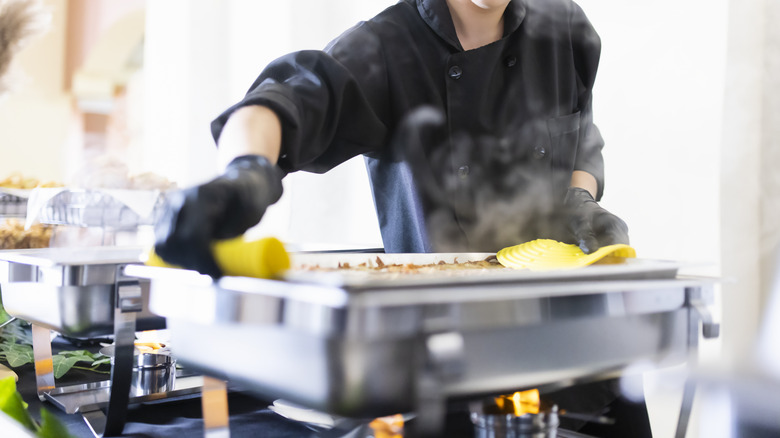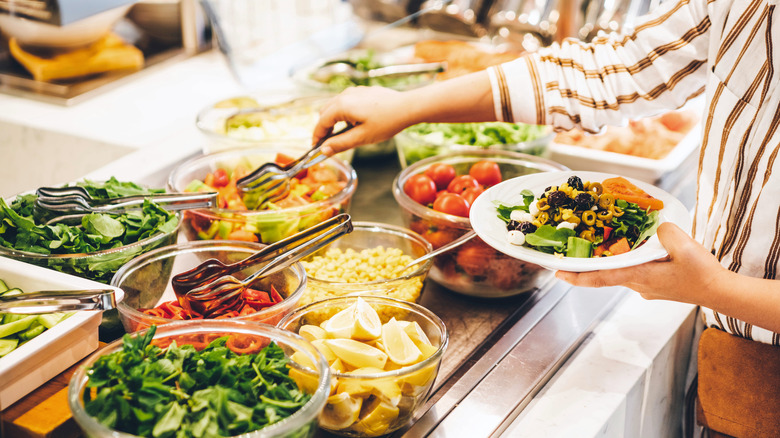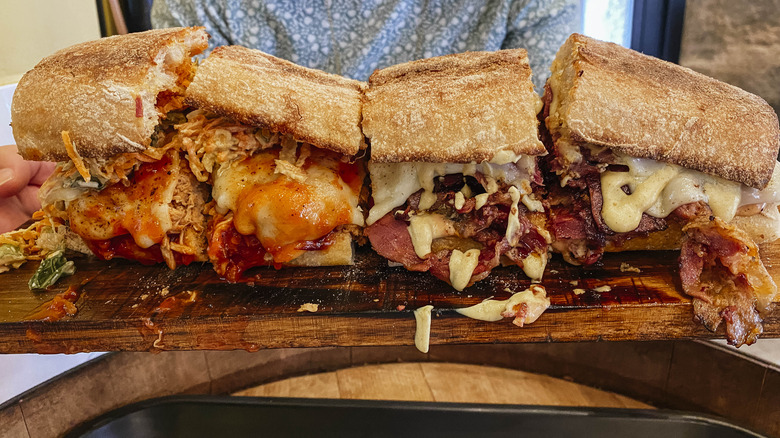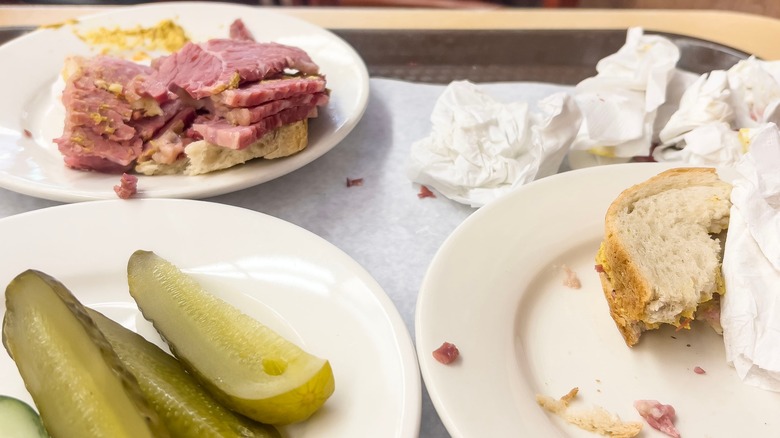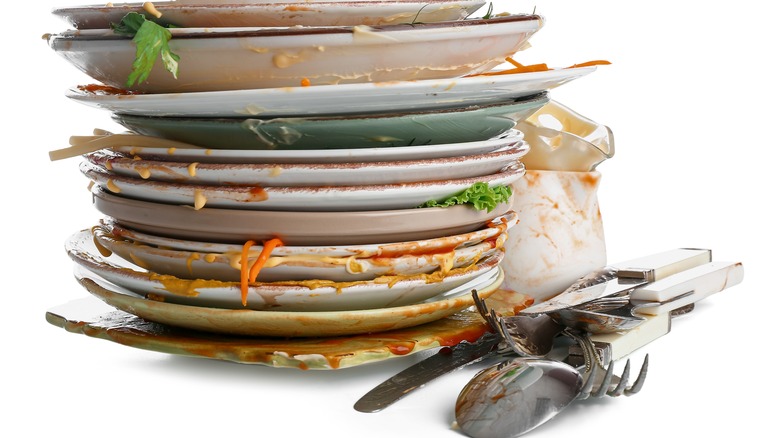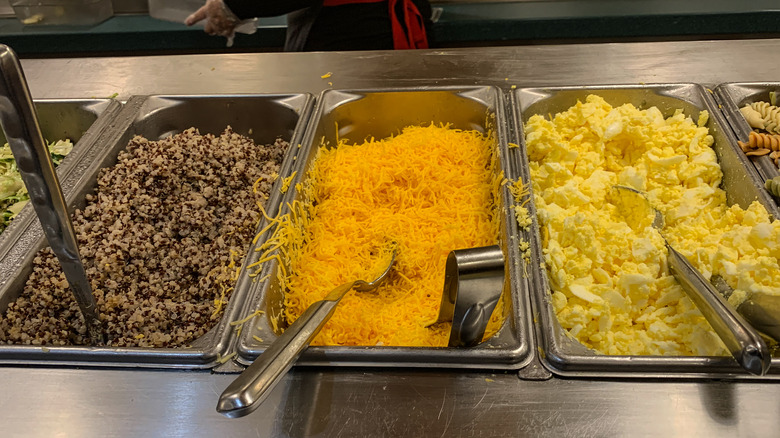The Biggest All-You-Can-Eat Buffet Myths Debunked
An all-you-can-eat (AYCE) buffet can be a lot of fun because you get to sample all this great food and get as much of it as you want for a price that's often very reasonable. But AYCE buffets are surrounded by a lot of myths because people don't understand how they work. Given that there are people who will go to these buffets specifically to load up on as much food as possible, how on earth do these places stay in business? How does the restaurant afford all that food when prices are so low? And what does the restaurant do with all that food left uneaten on people's plates? When people don't have the answers to these questions, they reach for what sounds like it makes sense — but all too often, that "sensible" answer isn't quite accurate.
It's easy to let these myths take over and turn the AYCE buffet into something it's not. We're here to dispel some of those myths so that you know what to expect, and so that you're aware of some potential issues that could affect how much you enjoy a trip to the buffet. As with any group of myths, some of these have a basis in fact; it helps to know when you should actually believe some of these myths, and when you should ignore them. So, let's debunk some of the biggest all-you-can-eat buffet myths.
Myth: Buffets serve carbonated drinks to try to make you eat less
This myth is kind of a weird one: Some believe that buffets serve carbonated drinks in order to make you feel fuller so that you eat less. The logic is that the carbonation makes you feel like you're not as hungry, so you end up eating less and saving the restaurant some money. And when you have a sugary, non-diet carbonated drink like soda, those calories can have an effect on how full you feel. But you'd have to drink a lot of soda for that to be what's making you feel full, and this myth isn't concerned with calories. It's about the carbonation, and interestingly, carbonation may have the opposite effect of what the myth claims it should do.
A few years ago, there was a nifty little study that found that carbonated water led to an increase in ghrelin, the hunger hormone. That study was very small, however, so it can't really be applied to everyone until larger studies are completed. But carbonation may help your body digest food, which could lead to you feeling hungrier, sooner. So buffets likely aren't giving you carbonated drinks to make you eat less food.
False: If you don't eat your money's worth, you're wasting that money
There's this rather insidious myth that if you don't eat all you can eat, you're not getting your money's worth, and you're wasting that money. This is not true. Yes, if you pay for a buffet, it's nice to get a full meal and eat the foods you like. But overeating in the name of "getting your money's worth" doesn't really help you. The push to get as much food as you can often leads to wasted food as people become much too full to eat more. And when you become much too full to eat more, all you end up doing is making yourself feel physically bad.
Instead, look at the buffet as a chance to have a variety of foods that you didn't need to cook and that you don't need to wait for. Check out what's available and choose what you want to eat carefully; if you're at an AYCE buffet, you can always go back and get more. Get your money's worth by curating your plate carefully. If you finish and want more, go back and once more get a plate that you've carefully filled with reasonable portions. That way, you eat a satisfying amount of food you like without having any regrets later on in the evening.
Sometimes a myth: You can never get anything to go after a buffet
When you have leftovers at a regular restaurant, getting them wrapped up to go is a totally normal request. But taking home leftovers from a buffet is a different matter. AYCE buffet owners want to be sure people aren't loading up a second plate just to take that food home without eating any of it at the restaurant, so policies about what you can take home are going to vary widely. Some places actually don't mind wrapping up a few leftovers when it's obvious that they were truly left over from what you were eating, so it's not true that you can't take anything home.
But others are way more strict. Some prohibit taking anything outside the restaurant; others will charge a per-pound price and actually weigh your leftovers, or will charge a fixed fee. If you're worried about wasting food, it's better to be careful about what you take in the first place; after all, you're at an AYCE buffet and can go back to get food whenever you want. Keep in mind, too, that policies can change. It's best to double-check a buffet's leftover/takeout policy each time before you go.
False: Buffets prepare everything from scratch
That buffet touting AYCE homestyle food must make everything from scratch, right? No. In fact, chances are what you're eating contains food that was frozen and warmed up in the restaurant's kitchen. But this one isn't so bad, really; yes, if the restaurant advertises making everything from scratch and they don't, then you could have a false-advertising claim on your hands. But most restaurants don't claim that, and most, it turns out, use a lot of frozen food.
Sometimes the food is prepared in a central factory and sent to buffets that have similar formats. It's just easier for the restaurants to get that food from a place that produces it in bulk and freezes it. Other times, the buffet gets frozen food to ensure they'll have enough. For example, supply chains have had to deal with everything from the pandemic to cyber attacks, along with threats of widespread port workers' strikes. And that's in addition to seasonal variation in food availability. Rather than get fresh vegetables that could rot quickly and then risk not being able to get more, restaurants buy frozen vegetables in large amounts and store them in the freezer so they can have them whenever they need them. So, this is one revelation that's rather reassuring.
Myth: Fresh, new ingredients are used daily
Not all of the food at a buffet is guaranteed to be fresh and new. Sometimes those buffets repurpose leftovers. However, this doesn't involve food that you've put on your plate (and we'll address that in another section). What some buffet restaurants do actually do is reuse food from the buffet that no one took, if the food was safe to use again. For example, bread that no one took might be reused the next day in bread pudding, or vegetables might be used in soup. If you're at a good restaurant that follows food-safety rules, they're going to toss items that wouldn't be safe to reuse, and safely store other items that could be used in new dishes the next day.
This makes sense. Food forms the largest part of a buffet restaurant's budget. Given how much food people can waste, especially at AYCE buffets, those restaurants are going to want to conserve what they can. It's only a problem if a restaurant doesn't follow food-safety rules, and you end up with food that gets reused for too many days or that hasn't been kept at the right temperature on the buffet table. One more issue is that you don't know how many customers have been at that pan and handled the serving utensils (and we'll talk about that later, too). So it's in your best interests to find buffets that appear to take food safety seriously.
False: All the food is fresh no matter when you go during the day
All-you-can-eat buffets rely on people being able to take food whenever they want, which means food has to sit out. Good buffets keep foods at proper temperatures for food safety. But it's very easy for there to be a mistake, where food ends up being too warm or too cool for too long. And some places might not remove old food, instead mixing it with the new tray that was just brought out. That can lead to food poisoning. It's essential that you stick with buffets that are popular because that means there's more turnover for the food. You're likely to get fresher food that hasn't been sitting out for more than two hours.
Also keep in mind that even with high turnover for the food, that food can still sit out for a while. You may be digging into macaroni salad that's been sitting in a tray for an hour and a half, or getting a drink out of a carafe that's refilled but not washed until the end of the day. That's not the freshest food, even if kept at safe temperatures and is safe to consume. Just keep that in mind when choosing a buffet and choosing what to eat.
Myth: You only have to worry about the food in terms of health and safety
We hope you're not eating at a buffet as you read this one. But you know how people worry about the safety of the food at buffets? That's not the only thing you need to worry about. Those serving utensils are just as questionable. Everyone has touched them, and sometimes the handles fall into the food. Now think about how many people don't wash their hands after going to the bathroom, and how many people may have coughed or sneezed into their hands before grabbing one of those spoons. Yeah, it's not a pretty picture.
You have two strategies for dealing with this, if you still want to eat at a buffet. One is to be first in line. If you're the first person to touch the utensils, then you're not dealing with other people's icky behavior. The other is to take food from the back of the container because, if the utensil drops into the food, the handle won't end up in that part of the container. Sometimes buffets have two lines of people around one row of containers; in that case, take food from the middle, if it looks like the container is long enough so that handles won't touch that part of the food.
False at many places: You can get discounts if you can't eat much
A buffet where you pay one price to eat all you can is a great deal for most people. It's not a great deal if you can't eat a lot due to a medical condition. With the rise in bariatric surgeries that limit a person's ability to eat, more and more people face the problem of having to pay full price for food they really can't eat. The solution for a lot of people has been to get a card from their surgeon noting that the person has had surgery and can't eat a lot. These cards request a discount or the ability to order off the kids' menu and are meant to be used at all restaurants, including buffets.
The problem is that not every buffet will honor those cards. Some do, realizing that the person really won't eat that much. Others don't, and as mean as that seems, the restaurant is not required to discount the price of its food. If you decide to have bariatric surgery and receive one of these cards, always call any restaurant you want to go to ahead of time, and don't be surprised if it refuses to offer a discount or let you order a smaller amount of food for a lower price.
Mostly myth: You'll get kicked out or banned for eating too much
This is a myth with a little truth to it. In general, you're not going to get kicked out of an AYCE buffet for eating a lot. There have been cases where people were kicked out and even banned from buffets, but that was because they really went super-overboard with eating. For example, German website The Local De reported in 2018 that an athlete was banned for eating nearly 100 plates of sushi. Others have been banned for behavioral issues, such as eating so much and so quickly that there was no food left for other customers.
But that's really outside the norm. Most people can't eat that much, and most "heavy eaters" are quickly balanced out by all the other diners who don't eat a lot or who tend to eat cheaper foods. Some restaurants have started using time limits, where people pay for a couple of hours of all-you-can-eat buffet foods. You may also see limits on the number of items you can take at any one time, too. That limits the damage if someone really goes to town and grabs all the shrimp, for example; they may do that for a couple of hours, but then they're out.
False: Leftovers that customers didn't finish are reused the next day
A really common myth about buffets, as well as restaurants in general, is that the employees take your leftovers and put them back out on the buffet table the next day. If you leave a bunch of salad, those leftovers supposedly get thrown right back into the salad container for the next day's customers. That is a disgusting thought, and we're happy to say that in general, it isn't true. Maybe there's a rogue restaurant out there that's doing this and really needs a major health inspection, but reputable restaurants don't do this. For one thing, it's a major violation of health codes, and second, the staff just doesn't have time to separate everything on your plate. Your food has likely been sitting out for too long, anyway, once you've finished and left the buffet. That doesn't stop rumors from flying, of course.
It is true that when given the opportunity, people will take more food than they can finish. Buffet restaurants have to find ways to control food waste, but reusing what you put on your plate isn't one of them. And if a restaurant does have anti-waste measures in place, such as clean-plate rules, then there's nothing left over to reuse to begin with.
Myth: Servers won't pick up dirty dishes because they don't care about hygiene
If you've been to a buffet where you went through the line several times, you've seen dishes pile up on the table. And you've probably wondered why no one was coming by to pick them up. There's a reason for that, but it's not because no one cares about hygiene, as so many anti-buffet people claim. One potential reason is that leaving all those plates subtly reminds you of how much you've eaten, thus discouraging you from going back to get yet more food. However, this is unsubstantiated.
A more likely reason has to do with etiquette and ensuring no one feels rushed. If a busser takes away a bunch of plates, it could make the customer feel like they're being pushed out. In fact, servers and bussers are often taught to not remove dirty dishes, especially when one person is still eating. It's seen as potentially making that customer feel uncomfortable. Customers have been known to remind servers and bussers not to remove dishes until everyone was done eating. Regardless of which reason is true, you can rest assured that the employees do care about table hygiene. And if you really want to move those dirty dishes out of the way, don't put them on an empty table. Either politely grab the attention of a nearby busser, or bring the dishes to a dirty-dish bin near the kitchen, if you see one.
Alarmingly false: If you have a food allergy, just avoid the selections you're allergic to
You've got this huge spread of food in front of you, with everything in separate containers with separate serving utensils. So, if you have a food allergy, you just need to look for the containers that have foods that are safe for you, right? Well ... no. Those open containers of food are sitting ducks in terms of cross contamination. From food falling off serving spoons as customers reach across the buffet table to people using one serving spoon to grab food from several containers, there are a bunch of opportunities for contamination to occur.
There is some good news in that a few buffets have allergy policies that help diners navigate the buffet line safely. But many don't, and the general advice in these situations is to avoid eating from the buffet. You may still be able to order food from the kitchen just for yourself, but that isn't a guarantee. The best thing to do is call ahead and ask about allergy-friendly policies and procedures, and find another buffet if the one you call doesn't have anything in place.
